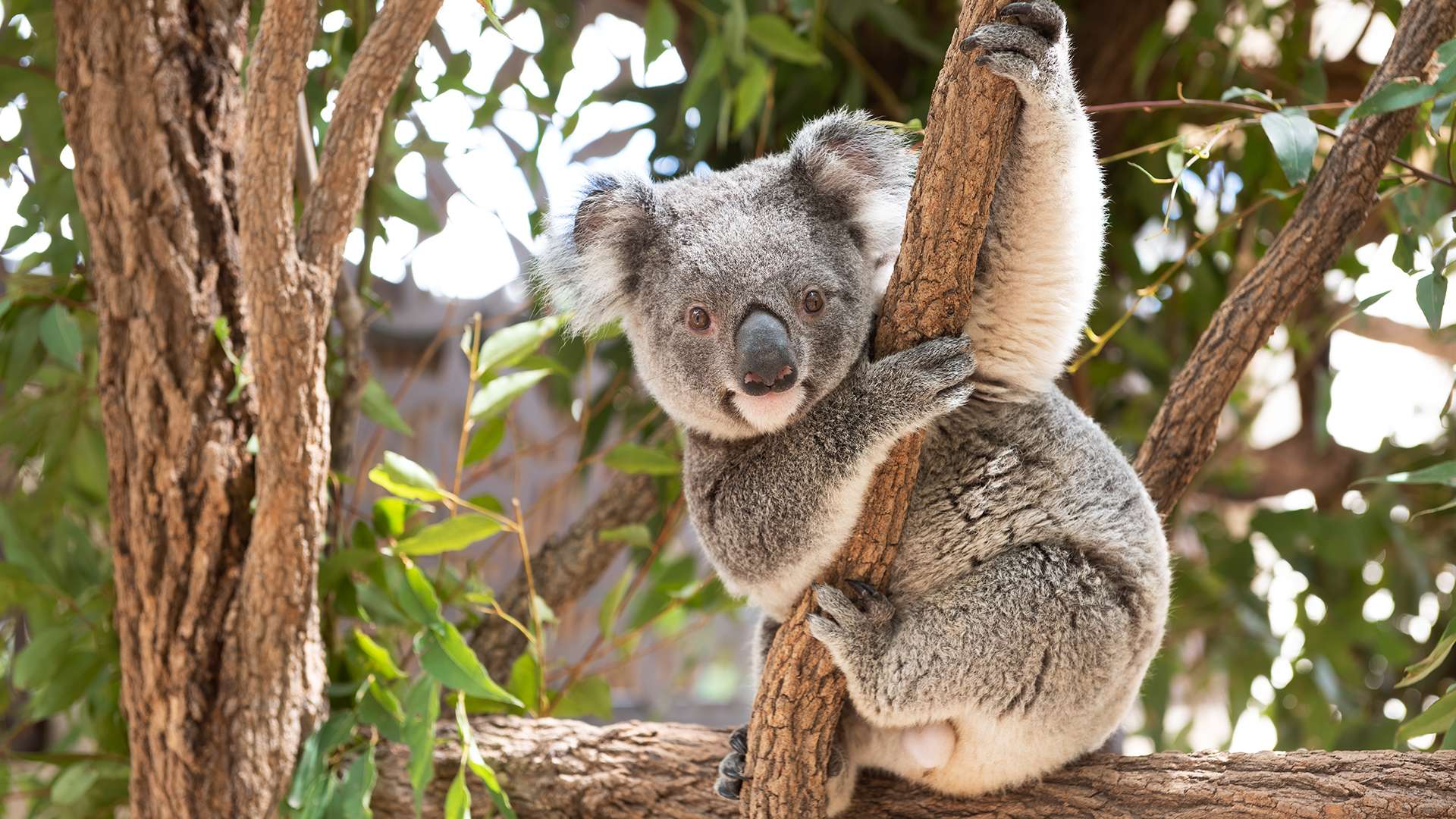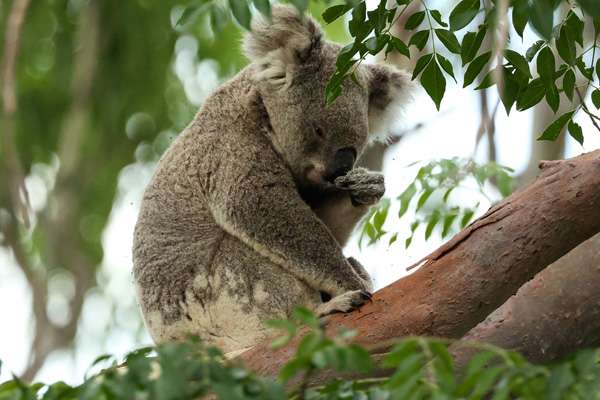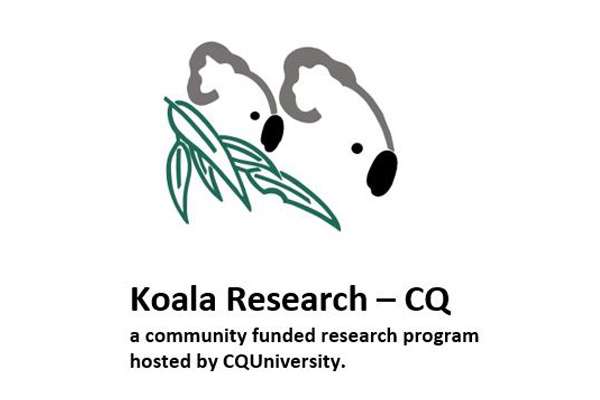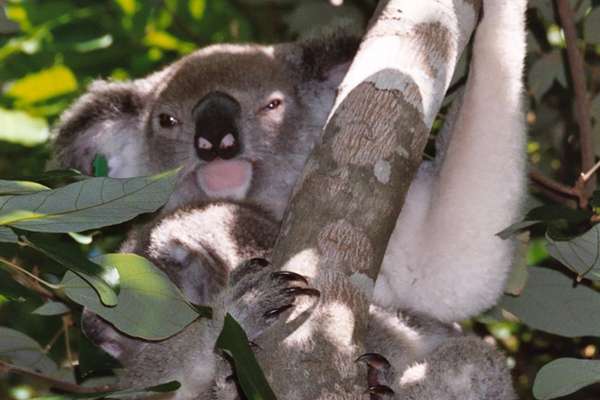
Our Koala Research – CQ group was established in 1994 to collaborate with communities and industries to enhance koala conservation through research. The group receives support and/or funding from a variety of stakeholders, research partners, community partners and individuals.
The group’s focus is on aspects of koala ecology, biology, history and community engagement in Central Queensland and beyond.
Day-to-day management is provided through the School of Health, Medical and Applied Sciences. The University provides financial oversight and ethical oversight is provided by its Animal Ethics Committee. Dr Rolf Schlagloth is the Research Group Leader.
Building 32 G.42 CQUniversity,
Rockhampton North, QLD 4701
Dr Rolf Schlagloth (Research Program Leader)
Phone enquiries: (07) 4930 6964
Email enquiries: Dr Rolf Schlagloth
The Koala Research – CQ Lab established the main cortisol metabolites in koala faeces and the baseline levels of these metabolites during the breeding and non-breeding seasons and between sexes. Our Lab also established that the tetrahydrocorticosterone enzyme immunoassay (50c EIA) is most suitable at detecting these metabolites to obtain consistent information. OUr researc has been looking at the correlation between stress and diseases and injuries in wild populations and hospitalised koalas.
This research has been supported by:
This research focuses on the hills and ranges associated with the Clarke-Connors Ranges from around Collinsville south to Marlborough.
This is a long-term study. The research program commenced in 2016 with funding from the Qld Department of Transport and Main Roads. This multidisciplinary program involves local landholders, CQUniversity, local community groups and other stakeholders. Areas of research include the ecology of the koala, population and habitat dynamics, threat abatement as well as broad-scale remote sensing of koala habitat landscapes.
Dr Rolf Schlagloth, Dr Flavia Santamaria and Dr Michael Hewson
This research seeks to improve the success of conservation programs for the endangered koala in Queensland by adopting a novel social science approach. Focusing on a key population of koala in the Central Queensland, it engages directly with key stakeholders such as the public, landholders and local rescue organisations. Knowledge of the cultural significance, history, attitudes to, and experiences with koalas form a critical foundation of any successful conservation strategy and such information is crucial to future koala conservation.
Three key CQ stakeholder groups are being engaged (1) landholders (2) general community members and (3) wildlife carers/veterinarians providing information. Key research questions across these groups include: (1) How are koalas represented in the oral histories of local landholders? What are their current attitudes toward koala conservation? (2) What importance do local CQ community members put on local koala population, do they know they exist? And (3) What input do wildlife carer and veterinarians have to the conservation of the species? Answers to these questions provide critical information for instigating successful management plans that are acceptable to all members of the community.
Dr Rolf Schlagloth, Dr Bradley Smith, Professor Tania Signal, Dr Michael Danaher, Dr Flavia Santamaria, Dr Douglas Kerling (Griffith University) and Dr Michael Hewson.
Rockhampton and Livingstone Local Government Areas and potential off-set properties.
This project explores the potential to recover koala populations in relic koala habitat in eastern Central Queensland. Initially, the project will test the feasibility of direct reintroduction or release of rehabilitated koalas, and develop the methodology for the acclimatisation, release and monitoring of the koalas. The project will also explore the needs of rural landholders to accommodate koalas into property planning.
Midland Highway, between the City of Ballarat and the township of Meredith (on the way to Geelong), Victoria. The study area focused on a 48 km stretch of highway with a detailed koala monitoring study along a 5 km section on both sides of the highway.
This study analysed data collected from local wildlife carers on sick and injured koalas to determine the significance to the local koala population of collision with vehicles. It further looked at koala road kills along the highway, attempts to identify koala road kill black-spots and ultimately aimed at developing a model to determine the parameters that are most significant in the formation of these black-spots. A koala population at one black-spot was radio-tracked for 6 months; here koala ranging behaviour, habitat utilisation and diet, as well as koala interactions with the road corridor, were investigated.
A range of koala habitats in Queensland - with an initial focus on South-East and Central Queensland habitat types in remnant and non-remnant landscapes.
As part of a successful 2017 Community Sustainability Action grants Round 1 – Koala Research - CQ was awarded $91,812.00 to study Koala habitat health. The project identified the most applicable satellite remote sensing tools for landscape-scale assessment of koala habitat condition change and developed a low-cost koala habitat 'health check' to enable rapid assessment of habitat before any management intervention.
Santamaria, F., Young, S., Valenza, L., Schlagloth, R., Henning, J., & Palme, R. (2026). Case Study: A Dexamethasone Suppression Test in Koalas (Phascolarctos cinereus). Veterinary Medicine and Science, 12(1), e70812.
Schlagloth, R., Santamaria, F., Cadman, T., McEwan, A., Danaher, M., McGinnis, G., ... & Dell, M. (2025). Community and Scientists Work Together to Identify Koalas Within the Plantations Inside the Proposed Great Koala National Park in New South Wales, Australia. Wild, 2(4), 42.
Schlagloth, R.; Danaher, M.; Hewson, M. & Santamaria, F. (2025). Koala Conservation in Central Queensland: Anecdotes, Stories and Perspectives from the Landholders and Wider Community.
10.20944/preprints202506.1342.v1
Schlagloth, R., Santamaria, F., Harte, M., Keatley, M. R., Geddes, C., & Kerlin, D. H. (2024). Landscape Homogeneity May Drive the Distribution of Koala Vehicle Collisions on a Major Highway in the Clarke-Connors Range in Central Queensland, Australia. Animals, 14(19), 2902.
Schlagloth, R., A. Morgan, E., Cadman, T., Santamaria, F., McGinnis, G., Thomson, H., ... & Mcewan, A. (2024). Applying landscape-level principles to koala management in Australia: a comparative analysis. Journal of Environmental Planning and Management, 67(3), 542-563.
Schlagloth, R., Santamaria, F., Hewson, M., Danaher, M., Geddes, C., & Kerlin, D. H. (2024). Monitoring the effectiveness of fauna sensitive infrastructure along the Peak Downs Highway in Central Queensland reveals mixed results for koala conservation. Australasian Journal of Environmental Management, 1-30.
Santamaria, F., R. Schlagloth, L. Valenza, R. Palme, D. de Villiers, and J. Henning. 2023. “The Effect of Disease and Injury on Faecal Cortisol Metabolites, as an Indicator of Stress in Wild Hospitalised Koalas, Endangered Australian Marsupials.” Veterinary Sciences 10 (1): 65.
Danaher, M.; Schlagloth, R.; Hewson, M.; Geddes, C. (2023) One Person and a Camera: A relatively non-intrusive approach to Koala citizen science. Australian Zoologist, 43, 52–66.
Danaher, M., Shanks, B., Jones, B. T., & Schlagloth, R. (2023). How did they get there? A history of koalas on Queensland’s islands. Australian Zoologist, 43(2), 390-408.
Schlagloth, R., Hewson, M., Schultz, M., Danaher, M., & Santamaria, F. (2023). Gauging landholder attitudes and willingness towards koala conservation in a Central Queensland region. Australasian Journal of Environmental Management, 30(1), 68-87.
Santamaria, F., Palme, R., & Schlagloth, R. (2023). Discussion paper on 'Comparing the agreement of a commercial cortisol kit with a biologically validated assay in evaluating faecal cortisol metabolite levels in koala joeys'. Comparative Biochemistry and Physiology. Part A, Molecular & Integrative Physiology, 280, 111416.
Cadman, T., Schlagloth, R., Santamaria, F., Morgan, E., Clode, D., & Cadman, S. (2023). Koalas, Climate, Conservation, and the Community: A Case Study of the Proposed Great Koala National Park, New South Wales, Australia. The International Journal of Social Quality, 13(1), 25-55.
Schlagloth, R., Santamaria, F., Melzer, A., Keatley, M. R., & Houston, W. (2022). Vehicle collisions and dog attacks on Victorian koalas as evidenced by a retrospective analysis of sightings and admission records 1997–2011. Australian Zoologist, 42(3), 655-666.
Cahir, F., Schlagloth, R., & Clark, I. D. (2022). The importance of the koala in Aboriginal society in nineteenth-century Queensland (Australia): A reconsideration of the archival record. Anthrozoös, 35(1), 75-89.
Schlagloth, R., Golding, B., Kentish, B, McGinnis, G., Clark, I.D., Cadman, T., Cahir, F. & Santamaria, F (2022). Koalas– Agents for Change: A case study from regional Victoria. Journal of Sustainability Education, Vol. 26, February 2022.
Clark, I. D., Schlagloth, R., Cahir, F., & McGinnis, G. (2022). Kurrburra the Boonwurrung ‘Wirrirrap’ and Bard (1797-1849). Australian Studies Journal Zeitschrift für Australienstudien, 36 — 2022. DOI: 10.35515/zfa/asj.36/2022.03
Santamaria, F., Schlagloth, R., Palme, R., & Henning, J. (2021). Over time decay of cortisol metabolites in faecal pellets of koalas in Central Queensland. Animals, 11(12), 3376.
Santamaria, F., Palme, R., Schlagloth, R., Klobetz-Rassam, E., & Henning, J. (2021). Seasonal variations of faecal cortisol metabolites in koalas in South East Queensland. Animals, 11(6), 1622.
Santamaria, F., Barlow, C. K., Schlagloth, R., Schittenhelm, R. B., Palme, R., & Henning, J. (2021). Identification of koala (Phascolarctos cinereus) faecal cortisol metabolites using liquid chromatography-mass spectrometry and enzyme immunoassays. Metabolites, 11(6), 393.
Watkins, A., Schlagloth, R., & Santamaria, F. (2021). A snapshot of koala tree use at the mount Gravatt outlook reserve. Queensland Naturalist, 59(1/2/3), 3-23.
Cahir, F., Schlagloth, R., & Clark, I. D. (2020). The historic importance of the koala in Aboriginal society in New South Wales, Australia: An exploration of the archival record. ab-Original: Journal of Indigenous Studies and First Nations and First Peoples' Cultures, 3(2), 172-191.
Clark, I. D., Schlagloth, R., Cahir, F., & McGinnis, G. (2020). Kurrburra the Boonwurrung 'Wirrirrap' and bard (1797-1849)-a man of high degree. Australian Journal of Biography and History, (4), 73-91.
Schlagloth, R., Santamaria, F., Golding, B., & Thomson, H. (2018). Why is it important to use flagship species in community education? The Koala as a case study, Animal Studies Journal, 7(1), 127-148. http://ro.uow.edu.au/asj/vol7/iss1/7.
Schlagloth, R., Cahir, F., & Clark, I. (2018). The importance of the koala in Aboriginal society in nineteenth-century Victoria (Australia): A reconsideration of the archival record. Anthrozoös, 31(4), 433-441.
Wedrowicz, F., Wright, W., Schlagloth, R., Santamaria, F., & Cahir, F. (2017). Landscape, koalas and people: A historical account of koala populations and their environment in South Gippsland. Australian Zoologist, 38(4), 518-536.
Santamaria, F., and R. Schlagloth (2016). “The Effect of Chlamydia on Translocated Chlamydia-Naïve Koalas: A Case Study.” Australian Zoologist, 38 (2): 192–202.
Schlagloth, R.; Hewson, M. & Santamaria, F. (2025). Monitoring the effectiveness of fauna sensitive infrastructure along the Peak Downs Hwy (Phase 2). A report to the Department of Transport and Main Roads (Mackay). Koala Research-CQ, CQUniversity, Rockhampton, Australia.
Schlagloth, R.; Hewson, M.; Geddes, C. & Santamaria, F. (2025). Clarke-Connors Range Koala Monitoring and First Nations Training - Phase 2 – Widi. Report to the Fitzroy Basin Association. Koala Research – CQ, CQUniversity, Rockhampton, Australia.
Schlagloth, R.; Hewson, M.; Geddes, C. & Santamaria, F. (2025). Clarke-Connors Range Koala Monitoring and First Nations Training - Phase 2 – Barada Barna. Report to the Fitzroy Basin Association. Koala Research – CQ, CQUniversity, Rockhampton, Australia.
Schlagloth, R.; Hewson, M.; Geddes, C. & Santamaria, F. (2025). Yuwi People’s exploration of koala conservation in the Mackay region - Report to Yuwi Aboriginal Corporation RNTBC and Greening Australia June 2025. Koala Research – CQ, CQUniversity, Rockhampton, Australia.
Hewson, M.; Schlagloth, R. & Santamaria, F. (2025). Burdekin Falls Dam wall raising project - an alternative approach to assessing Koala habitat. Koala Research – CQ, CQUniversity, Rockhampton, Australia.
Schlagloth, R.; Hewson, M.; Santamaria, F. & Geddes, C. (2024). Clarke-Connors Range Koala Monitoring on Cattle Properties while Training the Trainers. Report to the Fitzroy Basin Association. Koala Research – CQ, CQUniversity, Rockhampton, Australia.
Hewson, M.; Schlagloth, R. & Santamaria, F. (2023). National Koala Monitoring Program 2023: Selected Sites in the Clarke-Connors Range. Koala Research – CQ, CQUniversity, Rockhampton, Australia.
Schlagloth, R.; Hewson, M. & Santamaria, F. (2022). Monitoring the effectiveness of fauna sensitive infrastructure along the Peak Downs Hwy (October 2022). A report to the Department of Transport and Main Roads (Mackay). Koala Research-CQ, CQUniversity, Rockhampton, Australia.
Schlagloth, R.; Geddes, C.; Hewson, M.; & Santamaria, F. (2022). Clarke-Connors Range Koala Monitoring on Cattle Properties while Training the Trainers. Report to the Fitzroy Basin Association. Koala Research – CQ, CQUniversity, Rockhampton, Australia.
Schlagloth, R.; Hewson, M. & Santamaria, F. (2022). Koala Survey at Adair cattle property (near Sarina) Report to the Fitzroy Basin Association & CSIRO. Koala Research – CQ, CQUniversity, Rockhampton, Australia.
Schlagloth, R. (2018). Managing Central Queensland’s Clarke Connors Range Koala Population Predicting Future Koala Road-Kill Hotspots. A Report to the Department of Transport and Main Roads, Qld; Koala Research-CQ, CQUniversity, Rockhampton, Australia.
Koala research at CQUniversity is supported by various funding sources, including competitive research grants, sponsored research, and donations (select research and then koala research from the drop-down menu) from the general public.
Our research students are driving meaningful change through innovative and impactful projects in environmental science, conservation, and spatial analysis.

Our team advances koala conservation through science, community engagement, and a deep understanding of koalas and their habitats.

Browse our latest Koala CQ News

CQUniversity Australia is a trading name of Central Queensland University
ABN: 39 181 103 288
RTO Code: 40939
CRICOS: 00219C
TEQSA: PRV12073